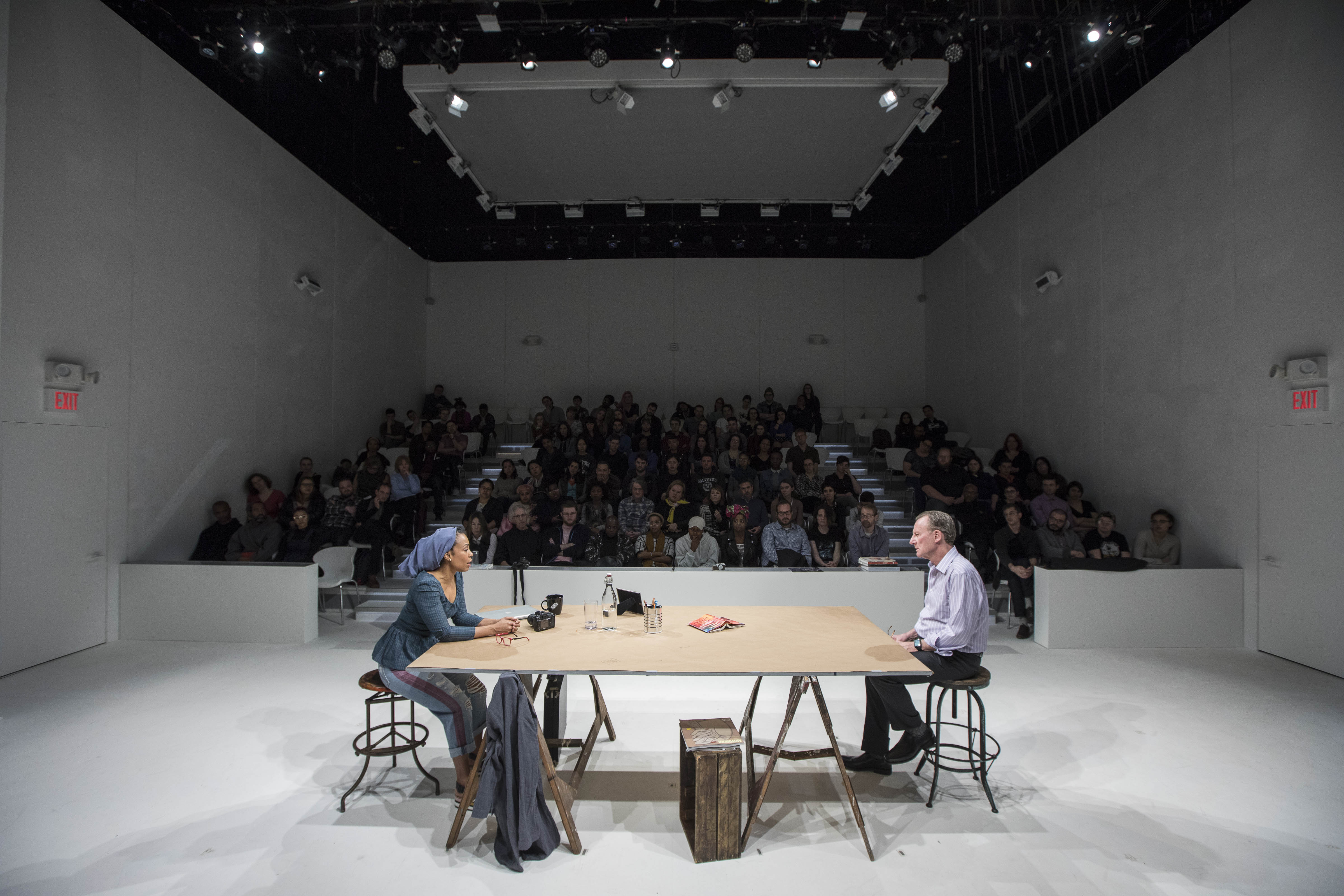Share This:
December 11, 2020 | Events, Race and Equity,
How to Name a Problem
ArtsEmerson has curated several long arc relationships with artists throughout our time, furthering conversations of art-making’s intersections with social and political issues. Poet, playwright, and author Claudia Rankine is one such artist, partnering with ArtsEmerson over a series of projects, including her full length play The White Card, co-developed with the A.R.T. and presented during our 2017/18 season. A MacArthur Fellow, New York Times Bestseller, and the recipient of honors such as National Book Critics Award, Los Angeles Times Book Prize, and the Bobbit National Prize for Poetry, Rankine’s work speaks to the experience of racial inequities in society, investigating the boundaries of poetic form and skin color alike.
Her most recent book, Just Us: An American Conversation, was released earlier this year and is perhaps her most personally exposed collection yet, stringing together poems, essays, and images that engage with each other on the subject of naming and engaging whiteness. In particular, Rankine asks what does it mean, and why does it matter, to stay in the room during these difficult and necessary conversations? And, in staying in the room, how do we name the problem we’re experiencing without becoming the problem in the room? These questions are not only the driving narrative of her book, but the subject of the recent Town Hall with David Dower, David C. Howse, and Claudia Rankine.
“I think in many ways it translates to the artistic experience where we are put in proximity with each other, when we are diverse, in a shared experience, that allows us to wrestle with, to squirm, to celebrate all that’s being provoked in the in the piece,” ArtsEmerson Executive Director David C. Howse commented. “But what happens once the show is over? How do you actually stay in that conversation?”
We see this reflected in The White Card, as Charlotte, a prominent Black artist, attends a dinner party hosted by a white art-collecting family. “During the development of that play, somebody would inevitably say to Claudia, I don’t know why Charlotte stays in the room,” recalled Artistic Director David Dower. “Why would she stay? This isn’t real. And Claudia’s answer was always, ‘Did you ever leave a room? Like, have you ever actually left a room like that? I’ve been at these dinner parties, and I’ve never just walked out.’”
It’s a central tenet of ArtsEmerson’s mission to explore how art can be a potential catalyst for overcoming our largest societal issues. However, merely leaving your body in the room isn’t enough to catalyze change. “People physically don’t leave the room, but they leave the conversation,” Dower added. ”Here I’m speaking specifically to white folks in conversations about race. So often, though we’re physically there, we’re finding ways to not be in the conversation. Whether through defensiveness, clamming up, or reciting all of our experiences of diversity to prove that we’re still listening. We are there, but we are not present.”
There is a different level of awareness and impact for people of color who stay in the room, and navigate white defensiveness. In order to even be invited into the room or to participate in the conversation, people of color are expected to edit themselves to adhere to the status quo of white authority in virtually any dialogue. “Generally speaking, as a person of color, you are playing a role, because you have to be in the room. But to be in the room, you’ve got to put all this armor on and it’s not you in the room, it’s this person who has to endure all kinds of things,” Howse remarked, referring back to Charlotte’s struggles in The White Card.

Photo Credit: Gretjen Helene Photography
For ArtsEmerson and our audience, how we unravel the intricacies of power, race, and artistry is an ongoing learning process, aided by an ongoing, open dialogue within our organization. How do we interrogate whiteness without centering it? Is it possible to decenter and focus on it at the same time? How do we name problems in an effective manner? And when those problems are named, how do we, as individuals and as a collective, stay fully present in the room knowing we may never solve them?
In Just Us, Claudia Rankine asks these questions and more– of herself and her readers–, encouraging us all to engage in these conversations and stay there despite the unlikelihood of resolved conclusions. We were delighted to have Claudia Rankine joining ‘the Davids’ to do just that.
Let us know what questions or comments you have after watching the Town Hall with Claudia Rankine in the comments below and thank you for joining us.




Much of yesterday’s conversation stayed with me throughout the evening. But, what made yesterday’s conversation fabulous for me was the opportunity to hear Ms. Rankine talk about how she makes her art. It was pure joy to listen to how she constructs her works. It was one of the first times I got a sense of the artistic practice behind her various works’ development. I really appreciated David Dower’s questions and comments at the end of the session. To me, the final elements and the opportunity to hear such an amazing artist talk about her creative process was a great bonus to the thoughtful conversation about the questions her work raises. Thank you
The authenticity of the conversation made it very intimate and engaging. It felt dynamic and honest, as all the Town Halls have, but especially so with Claudia Rankine’s clear, thoughtful responses to your questions. I felt privileged to listen in the conversation.